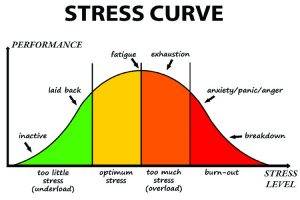Stress and the lack of sleep plague the lives of many of us. There are endless deadlines and expectations at the office, only to be replaced with commitments and more expectations upon arrival at home. Even children are not spared this ‘epidemic’ with parents sending them to art, music, martial arts and language classes, expecting them to perform well at each and every of those, on top of having to juggle their studies at school.
Table of Contents
Fat?
If sleepiness and stress is not enough to contend with, there is the headache of ever-increasing weight. Have you ever thought that your ballooning shape is attributed to your being stressed and deprived of sleep? Now you know why those pounds refuse to go but instead keep piling up despite all the exercise and dieting. Studies have ascertained a correlation between stress and the lack of sleep with weight issues.
Researchers from Columbia University revealed that people who slept for only 4 hours a night consumed more calories than those who have had 9 hours of good sleep per night. The sleep-deprived participants were found to have consumed as much as 250-330 calories than the well-rested ones, with the additional calories mostly coming from junk food and ice-cream.
Being stressed and sleep-deprived is pretty unfortunate, because after putting on weight easily, you’d have more difficulty losing that weight. The International Journal of Obesity reported on 29th March 2011 that those who were so stressed that they barely slept 6 hours per night had more difficulty losing weight that those who had sufficient sleep. The study also investigated the quality of sleep, indicating that a long but restless sleep doesn’t do you much good. In short, if you’re plagued by stress and a lack of quality sleep, you’ll pile on the pounds easily but can’t shake them off as easy as they came aboard.
But how does being stressed and sleepy make me fat, you may wonder. Sleep-deprived people lack the leptin hormone that suppresses appetite. If a very healthy appetite isn’t bad enough, they also have higher levels of ghrelin, the hormone that stimulates hunger. That is a very potent combo that causes us to just eat and eat! Then, our bodies can actually help us cope with stress by producing cortisol, a hormone that manages stress. However, when stress becomes chronic, cortisol remains at a high level for a long period of time and causes food cravings. So, all the above explain why you constantly reach out for food whenever you’re being stressed and sleepy.
If you find that you tend to snack on potato crisps, chocolates and cakes, the preference for these foods can be explained scientifically too. High-carbohydrate foods are favoured by stressed people because these foods stimulate the production of serotonin, a chemical in the brain which has a calming effect. So, the term ‘comfort food’ has been explained.
How do I de-stress?
There is really no point getting all worked up by something at work or at home as stress will eventually kill you. There are two ways you can go about reducing stress: Take stress by the horns day by day while gradually cutting out stress from your life at the same time.
Short-term stress management
1. Have a mini-massage
If there is no one to give you a mini-massage at the end of the day, you can give yourself the ‘treat’. Close your eyes, empty your mind, rub your temples, pinch the spot between your eyebrows and rub your forehead. Repeat until you feel you’re more able to return to work or whatever it is you were doing.
2. Take deep breaths
Whenever you feel that you’re about to explode, stop whatever you are doing and inhale deeply into your belly. Then, exhale every drop of air out before repeating for 10 minutes. All tension should be gone by then.
3. Brisk walk for 10 minutes
Simply getting away from what you’re doing helps. Then, by focusing on your surroundings as you walk, your mind is taken off your worries, and the blood that flows through your body helps your mind to focus better.
4. Eat and do nothing else
Many of us have lunch at our desks or on the go, even while driving. For stress management, spend just 10 minutes eating, chewing slowly and focusing on your food without staring at the computer screen or juggling any other task.
5. Give yourself some time
Before calling it a day each night, spend 10 minutes doing something that calms and relaxes you. Soak in a warm bath, read or listen to soothing music, away from the computer, television, iPads and crying children.
As you can see, just 10 minutes is enough to relief stress temporarily. Of course, more is better but if time doesn’t permit you to go beyond, any relief is better than none. But while you can cope day to day, you should nip the problem in the bud to ensure that stress will not continue to plague you.
Long-term stress management
1. Learn to say “No”
Sometimes, we bow to the expectations of loved ones, superiors, workmates and society, doing and taking on things that we aren’t comfortable with. As a result, we end up unhappy trying to live up to their expectations. Learn to refuse; there’s no point making others happy if you yourself are not.
2. Be with positive people
The company you keep affects you a great deal. Who do you think will stress you out more – someone who constantly whines about every tiny thing or one who brushes off small misadventures and is certain that things will look brighter soon? If you find that your friends are starting to wear you out, it might be time to seek new company for the sake of your mental health.
3. Love your job
Not everyone is lucky to land their dream job with a dream boss. If there is something bugging you at work, find solutions to make work more pleasing. Constantly solve or eliminate unpleasantness, or move on if there is nothing you can do anymore. We spend the most of our waking hours at work, so it is utmost important that we must be happy with what we do for a living.
4. Appreciate what you have
More often than not, we lament about having to go to work, the not-so-cool car we drive, the holiday that costs too much… If we just sit back and consider that we have a job, a car and a holiday compared to those who are less fortunate, don’t you think those are reasons to be thankful for? Even the gift of sight and ability to walk and jump are things that we should count our blessings for each day. So when things don’t turn out the way you want it, focus on what you have instead of what you don’t.

















